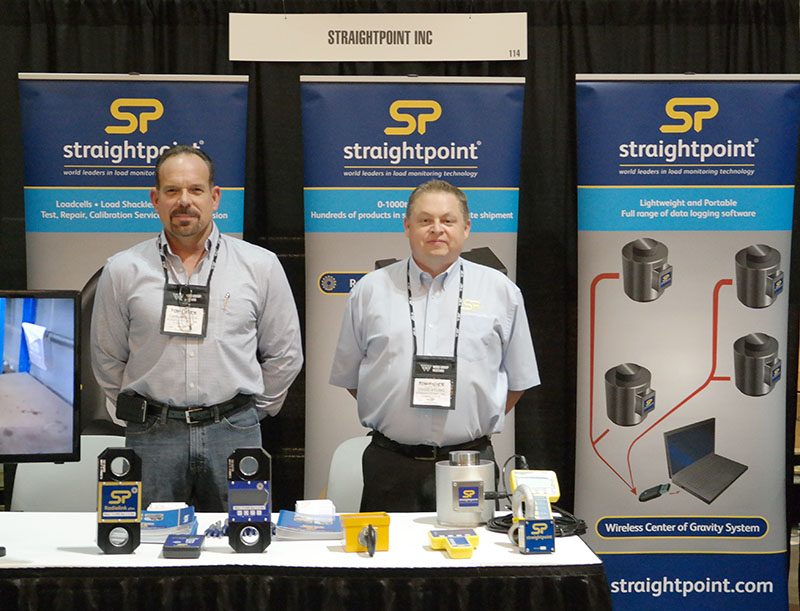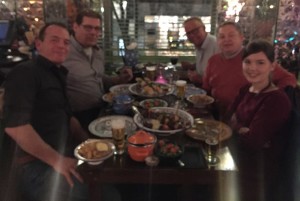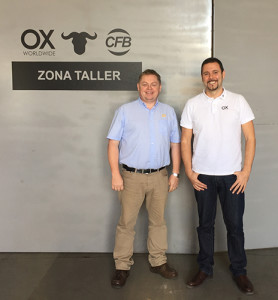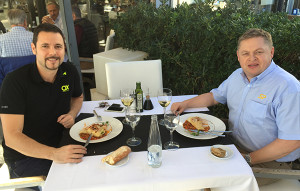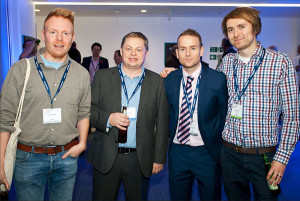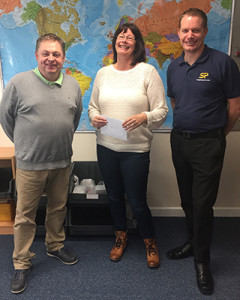As Mr. Loadlink recharges his blogging batteries on a well-earned vacation, John Molidor, general manager, Straightpoint Inc., explains why people matter even in a modern, high-tech world.
A lot has changed since I joined Straightpoint Inc., but I will remain true to certain principles. I said in my first interview at the company (four-and-a-half years ago) that I would strive to build a rapport with people and aim to deliver the highest level of customer service at the first point of contact. I’m just as passionate now about delivering on those promises every day.
My role is different to that which I took on in the spring of 2012. Regular blogger Mr. Loadlink, aka Straightpoint CEO David Ayling, described us as a gazelle company recently, which was very apt. Such growth generates a lot of emails, spreadsheets and other distractions but, as this week in Tulsa, Oklahoma and Wichita, Kansas with distributor Bishop Lifting Products Inc. reminded me, I feel at my most effective when I’m out of the office or dealing with people.
‘People’ is the overarching theme of this guest blog, hence my choice of headline, but I’ll also touch upon products and the state of the market. As so many stories do, my one starts with the phone ringing…
“Wow! You answered!”
I wish I had a buck for every time someone said that to me when I picked up the phone. It never ceases to amaze me. Is it really progress that complex, automated answering systems are now so commonplace that people don’t even expect to get a human being on the end of the phone when they dial a number? I don’t think so.
I know this blog is read internationally so I’ll give my point some perspective. Here in the U.S.—Straightpoint Inc. headquarters are in Camarillo, California—about 75% of customers make their first contact with us by telephone and right now about 50% of those are reaching out to us for the first time. It is my impression that globally the percentage of email enquiries is much higher. I respect that U.S. industry is staying loyal to the more personal approach, but it’ll only continue if all links on the supply chain play ball.
Call of duty
Despite Straightpoint Inc. growing exponentially over the last five years, we still have a long way to go in raising awareness of the brand as other (inferior, most say) products that have been in the industry longer have the luxury of market share. Add to that the percentage of lifts that are currently happening even as you read this without proper information about the load, and Straightpoint only has a very slender slice of the pie.
I’ll elaborate on the status of our development later but I allude to it now because it isn’t uncommon for someone to call us having been dragged through the mangle of an automated telephone system at a competitor, lulled to sleep by on-hold music, or had their approach ignored completely. Each time the result is the same—they sought a force measurement solution and another supplier had failed to take the call.
Answering calls at Straightpoint is priority, as it should be at all businesses where enquiries are the lifeblood of a company’s existence, because we care about the people on the other end of the telephone. If there’s one thing I want readers to take from my first guest blog, it’s that human beings are important and, furthermore, we should all strive to uphold that in an environment where people skills are becoming a dying art form.
It goes beyond picking up the phone and being polite. Everyone who takes a call at Straightpoint knows how to react to certain questions and process an enquiry accordingly. This is only achieved with effective and regular product training. When a Professional Engineer has a requirement to measure a load, finding the right equipment based on their questions is crucial to building a rapport with new and existing contacts. Think of the percentage of new business we’re getting, as referenced above, and consider how important it is for us to get this right.
I’ll give you an incentive to scrutinize your own systems. As a result of taking a recent telephone call, we sent four 300-ton load cells to South Korea within four days; we shipped two from the U.S. and two from Europe. The extent of the customer’s gratitude proved that we’d exceed their expectations, provided a personal service and probably done something few, if any, of our competitors would have even contemplated—if they had answered the phone in the first place. It all started by picking up the phone and saying, “Hello”.
Upscaling
All people are important, not just customers. We have secured a number of high profile acquisitions recently, most notably Wayne Wille, technical sales manager; and Myron Jones, operations manager. Tressie LaBass, customer and sales support administrator; and Scott Abernethy, technical specialist, complete the team here in Camarillo, in addition to a presence in Houston, where Aaron Orsak, technical sales engineer, is based. All the while, we have to coordinate with the U.K. operation, which is also our manufacturing base. Remaining cohesive is a challenge, but one we overcome by understanding our roles and communicating effectively—sometimes by phone.
Wayne’s recruitment is particularly interesting in that we have traditionally sold our range of equipment as rigging products. We see ourselves as a below-the-hook equipment manufacturer, but one that is promoting a technologically advanced safety system. What Wayne brings to the company is a background and connections in the U.S. scale dealer network, which opens up a new avenue of distribution for us.
The scale industry is also more mature in terms of its uptake of load cell technology, which means Wayne can introduce our equipment to dealers that already have frequent dialogue with decision makers who purchase this kind of kit. I’m sure other companies that sell through dealer networks monitor equally varied levels of maturity in their supply chains and I’d encourage everyone to explore this fascinating dynamic.
Work to develop the more traditional rigging dealer network is ongoing and, despite recent progress, the potential remains huge, as I’ve said. Again, I’m not using this blog as a sales tool (I know the rules!) but fact is everybody who is exposed to our technology is impressed with it. I know of companies with 100 units from a competitor in stock who don’t take them out of the toolbox because they don’t trust them to operate properly if rigged in place for an extended period of time. Wayne has noted this positive energy already. However, we know people who have not used force measurement technology before or those who have been utilizing alternative equipment are not all going to make a wholesale change to Straightpoint overnight.
As our reputation grows, we continue to enhance our software, as demonstrated by the recent launch of Proof Test plus, which adds speed, accuracy and breadth to data recording and certification related to non-destructive load verification or proof load testing. Proof Test plus records data gathered by any Straightpoint wireless load cell, and creates a pass or fail certificate that includes a visual representation of the test (load versus time) in graph form. Information can be printed out directly as a PDF report, electronically transmitted or fed to the cloud.
State of the market
Given the opportunity, I want to close on a quick overview of the state of the market and the role diversification can play in hitting growth targets when key industries are slow. The Gulf Coast states were generating around 75% of our North American business. Despite the ongoing slump in the sector, we have still managed to grow overall, which is testimony to our success in penetrating other markets and introducing our force measurement equipment when it wasn’t perhaps considered before. Being proactive with a diversification strategy has been key. Reacting only when a hot market starts to cool is too late.
Oil and gas thought leaders remain undecided on the prospects for the industry heading into Q4 and 2017, but we’ll be ready for when it does start warming up. In the meantime, our mission continues to make the lifting industry a safer place. There are tens of thousands of cranes lifting without adequate information about the load, which is not acceptable given the equipment and knowledge now available to industry. I still hear horror stories about hazardous sectors assessing the ability of the crane to successfully complete a lift by the creaking noise it makes as it raises it off the ground! Honestly.
What does that say about the value of people?
John Molidor
General Manager, Straightpoint Inc.
Mr. Loadlink, aka Straightpoint CEO David Ayling, will be back next month (September).

